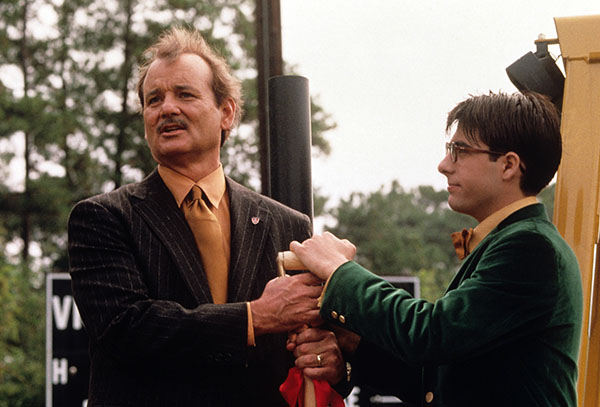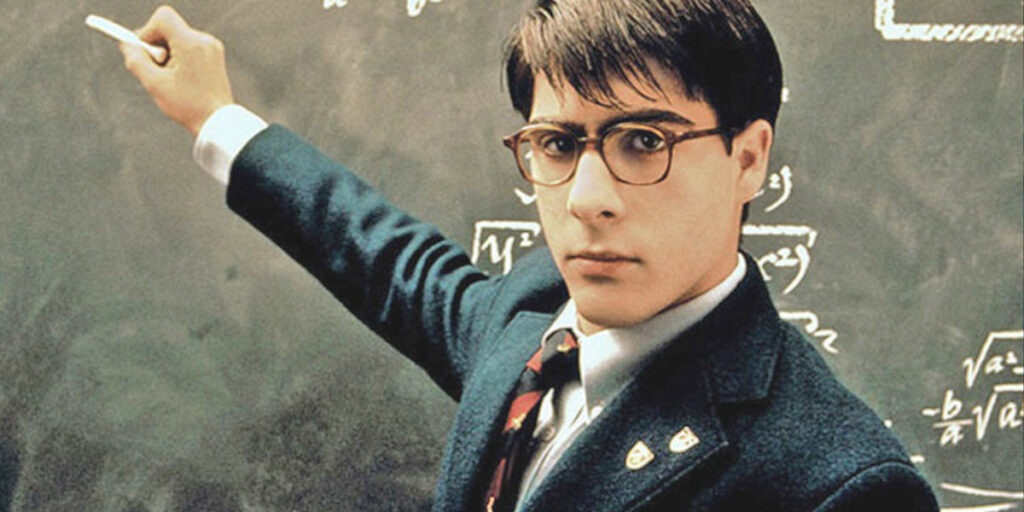Rushmore is Wes Anderson’s breakthrough film, which still manages to be both funny and thoughtful to this day.
Rushmore begins with an unrealistic fantasy. Max Fischer (Jason Schwartzman, of Asteroid City) solves an unsolvable math problem in his class, winning the approval of everyone. Then, the scene fades to show he is daydreaming at a boring assembly. Herman Blume (Bill Murray) addresses the students at Rushmore Academy with high regard, noting how prestigious an institution it is. Like the audience, Blume believes Max to be a bright student worthy of his position in the school, but as the headmaster Dr. Guggenheim (Brian Cox, of Succession) is quick to inform him, Max is one of the worst students there. This vignette makes the perfect tone setter for a silly but honest movie about the delusions we all probably felt at that age.
Rushmore is a story of delusions of grandeur, aspirations to be higher than one’s place in life. Max is not a child of wealth but a barber’s son, only admitted to Rushmore on a theater scholarship. This leads to a bit of an inferiority complex, with Max believing he should achieve more than he has. He does plenty of extracurricular activities but scores lower grades, putting him at risk of flunking out. Not one to be easily deterred by such threats, Max continues to pursue his theater passions and fantasies regardless of the consequences.
Director Wes Anderson is able to convey this message with his signature aesthetic and sense of humor. In only his second feature film, Anderson is able to make use of widescreen to show the breadth of the world around Max, making him seem smaller. The use of licensed music in the film, which is frequent, selects only the most meticulous choices, with emphasis on lyrical appropriateness. For example, “Making Time” by The Creation is used to show the wide array of activities Max engages in, detailing how Max “makes time” at school.

Anderson and co-writer Owen Wilson take from their own nostalgia to tell this tale. Like Max, Wilson was expelled from his prep school, and Anderson used his school to perform some of his earliest plays. This makes Rushmore feel like they are looking back on their own youth with a smile. Perhaps Anderson had similar aspirations when he was younger, and reflected those through the character of Max. The exaggerations and over the top schemes, like Max building an aquarium to fulfill his precocious crush on a teacher Rosemary Cross (Olivia Williams), seem like ideas that may have traveled through the heads of a young student. Nowhere but this movie would see anyone actually try them.
Max is a personification of the Dunning-Kruger Effect, a psychological phenomenon in which underachievers tend to overestimate their own abilities. Since Max is an adolescent, he has not yet grasped social expectations for him and strives to accomplish everything he can. While other movies would tell this story as a tragedy, Anderson and Wilson decide to aim for comedy. Max’s actions end up being so outlandish and implausible, the notion of them working is hilarious in itself. It is only after settling down and finding his place at his new school where he recognizes his true talents and learns to slow down just a little. Rushmore then becomes the story of a boy in over his head learning what his limitations are, and with just the right balance of serious and humorous, it conveys this message in an honest manner.
Rushmore is almost thirty years old, but it still manages to resonate with its characters and humor. The themes of understanding limitations and feeding into delusions are timeless, and the whole public vs. private school setting makes for a great framework of these themes. The character of Max is snobbish and pretentious, but not unlikable. Schwartzman’s performance conveys a likable if deluded goofball, which makes us want to see him succeed.
Through these themes of accomplishment and how people view themselves in their teens, Rushmore is a movie that will make you laugh, then make you think after. Together, Anderson and Wilson created the most sincere and hilarious movie about high school ever made.
Rushmore is now available to watch on digital and on demand. Watch Rushmore!

